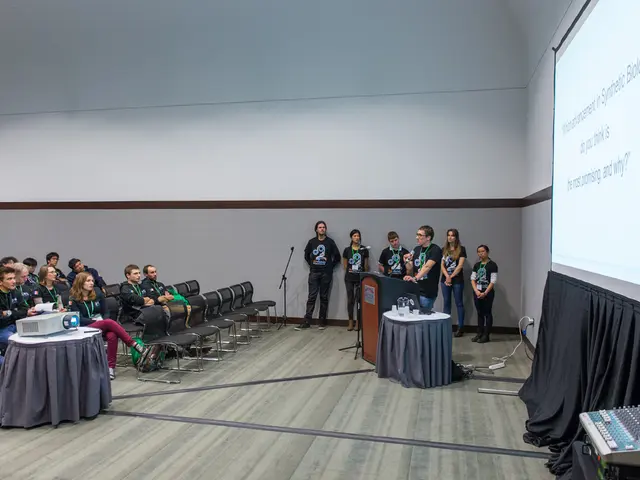Cyber Experts Admit to Feeling Overwhelmed by Workload in Recent ISACA Study
In a recent report released by the Information Systems Audit and Control Association (ISACA), the state of cybersecurity in Australia has been revealed to be facing significant challenges. The survey, sponsored by Adobe, polled over 1,800 cybersecurity professionals worldwide, including a substantial number from Australia.
The main reasons for the exodus of cybersecurity professionals in Australia include high work stress levels, poor financial incentives, and recruitment by other companies. This trend is causing concern among industry leaders, who are urging employers to address occupational stress to prevent burnout and attrition.
Jon Brandt, ISACA's Director of Professional Practices and Innovation, emphasises the importance of prioritising the well-being of cybersecurity staff. "Employees want to feel valued," he says, "and leadership should take care of their people, as the saying goes, 'take care of your people, and they'll take care of you.'"
However, the survey indicates that nearly half of the respondents in Australia believe their cybersecurity budgets are underfunded. This situation is further compounded by the fact that only a third of the respondents expect their budgets to increase in the next year.
The report also shows that more than half of the organisations in Australia report that their cybersecurity teams are understaffed. This shortage of skilled professionals is leading to increased cyberattacks, with 29% of organisations in Australia experiencing an increase in attacks. The top attack types include social engineering, third-party attacks, security misconfiguration, sensitive data exposure, and unpatched systems.
Despite these challenges, there are opportunities for those seeking a career in cybersecurity in Australia. Companies such as Shell Energy in Queensland, Boeing Defence Australia, and various roles listed on job platforms like Decipher Bureau are offering non-entry-level cyber security jobs.
Employers seeking qualified candidates prioritise prior hands-on experience and credentials held. However, the main skills gap identified in cybersecurity professionals are soft skills, particularly in communications, critical thinking, and problem-solving, as well as cloud computing.
Jo Stewart-Rattray, ISACA's Oceania Ambassador, stresses the need for vigilance, despite less reported cybersecurity incidents in Australia than the global average. She notes that 57% of respondents in Australia don't know what cyber insurance, if any, their organisation has.
Despite the stress and challenges faced by Australian cybersecurity professionals, 64% of them find their role more stressful now than five years ago. This is slightly higher than the global average of 45%.
In conclusion, the state of cybersecurity in Australia, as revealed by the ISACA survey, is facing significant challenges due to stress, underfunding, understaffing, and a skills gap. However, there are opportunities for those seeking a career in this field, and employers are prioritising hands-on experience and relevant credentials. Organisations must maintain vigilance and prioritise the well-being of their cybersecurity staff to retain talent and navigate the complex threat landscape.
Read also:
- InformationWarfare in the Modern Era: Enhancing an Information Strategy for today's Battlefield and Botnet Threats
- U.S. intelligence leader alleges UK succumbed to pressure over Apple data access request
- Politician's Rivalry Slips into Online Traps Made for Stealing Information via Social Media Phishes
- Top 46 Significant Tech Firms Based in Toronto






